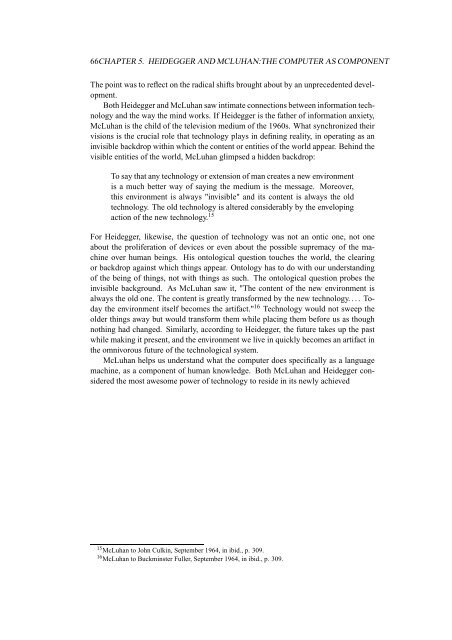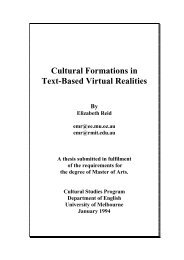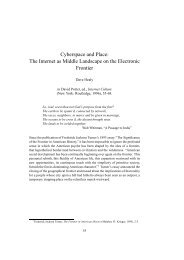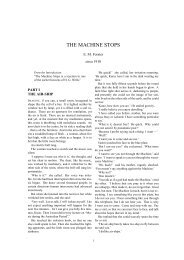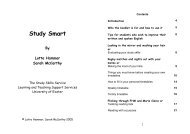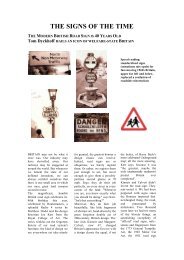PDF - The Metaphysics of Virtual Reality - University of Exeter
PDF - The Metaphysics of Virtual Reality - University of Exeter
PDF - The Metaphysics of Virtual Reality - University of Exeter
You also want an ePaper? Increase the reach of your titles
YUMPU automatically turns print PDFs into web optimized ePapers that Google loves.
66CHAPTER 5. HEIDEGGER AND MCLUHAN:THE COMPUTER AS COMPONENT<br />
<strong>The</strong> point was to reflect on the radical shifts brought about by an unprecedented development.<br />
Both Heidegger and McLuhan saw intimate connections between information technology<br />
and the way the mind works. If Heidegger is the father <strong>of</strong> information anxiety,<br />
McLuhan is the child <strong>of</strong> the television medium <strong>of</strong> the 1960s. What synchronized their<br />
visions is the crucial role that technology plays in defining reality, in operating as an<br />
invisible backdrop within which the content or entities <strong>of</strong> the world appear. Behind the<br />
visible entities <strong>of</strong> the world, McLuhan glimpsed a hidden backdrop:<br />
To say that any technology or extension <strong>of</strong> man creates a new environment<br />
is a much better way <strong>of</strong> saying the medium is the message. Moreover,<br />
this environment is always "invisible" and its content is always the old<br />
technology. <strong>The</strong> old technology is altered considerably by the enveloping<br />
action <strong>of</strong> the new technology. 15<br />
For Heidegger, likewise, the question <strong>of</strong> technology was not an ontic one, not one<br />
about the proliferation <strong>of</strong> devices or even about the possible supremacy <strong>of</strong> the machine<br />
over human beings. His ontological question touches the world, the clearing<br />
or backdrop against which things appear. Ontology has to do with our understanding<br />
<strong>of</strong> the being <strong>of</strong> things, not with things as such. <strong>The</strong> ontological question probes the<br />
invisible background. As McLuhan saw it, "<strong>The</strong> content <strong>of</strong> the new environment is<br />
always the old one. <strong>The</strong> content is greatly transformed by the new technology. . . . Today<br />
the environment itself becomes the artifact." 16 Technology would not sweep the<br />
older things away but would transform them while placing them before us as though<br />
nothing had changed. Similarly, according to Heidegger, the future takes up the past<br />
while making it present, and the environment we live in quickly becomes an artifact in<br />
the omnivorous future <strong>of</strong> the technological system.<br />
McLuhan helps us understand what the computer does specifically as a language<br />
machine, as a component <strong>of</strong> human knowledge. Both McLuhan and Heidegger considered<br />
the most awesome power <strong>of</strong> technology to reside in its newly achieved<br />
15 McLuhan to John Culkin, September 1964, in ibid., p. 309.<br />
16 McLuhan to Buckminster Fuller, September 1964, in ibid., p. 309.


